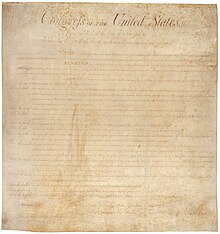
Back وثيقة حقوق الولايات المتحدة Arabic وثيقة حقوق امريكا ARZ Hüquqlar haqqında Bill (ABŞ) AZ Біль аб правах (ЗША) BE Закон за правата (САЩ) Bulgarian Declaració de Drets de la Constitució dels Estats Units Catalan Listina práv (Spojené státy americké) Czech Bill of Rights (Vereinigte Staaten) German Διακήρυξη των Δικαιωμάτων του Πολίτη Greek United States Bill of Rights English
| United States Bill of Rights | |
|---|---|
 First page of an original copy of the twelve proposed articles of amendment, as passed by Congress | |
| Created | September 25, 1789 |
| Ratified | December 15, 1791 |
| Location | National Archives |
| Author(s) | 1st United States Congress, mainly James Madison |
| Purpose | To amend the Constitution of the United States |
| This article is part of a series on the |
| Constitution of the United States of America |
|---|
 |
|
Preamble and Articles of the Constitution |
| Amendments to the Constitution |
|
|
| Proposed Amendments |
| History |
| Full text of the Constitution and Amendments |
The Bill of Rights is the name for the first ten amendments to the United States Constitution, which limit the power of the federal government and guarantee citizens of the United States certain rights. The amendments were written in 1789 by James Madison, and were based on important ideas about personal rights. The Bill of Rights went into effect in 1791, when 3/4 of the states agreed that they were fair. Originally, the Bill of Rights had 12 different amendments, but the first two were not passed by enough states. The second amendment that was not passed was eventually added to the Constitution in 1992, becoming the 27th amendment in the Constitution.